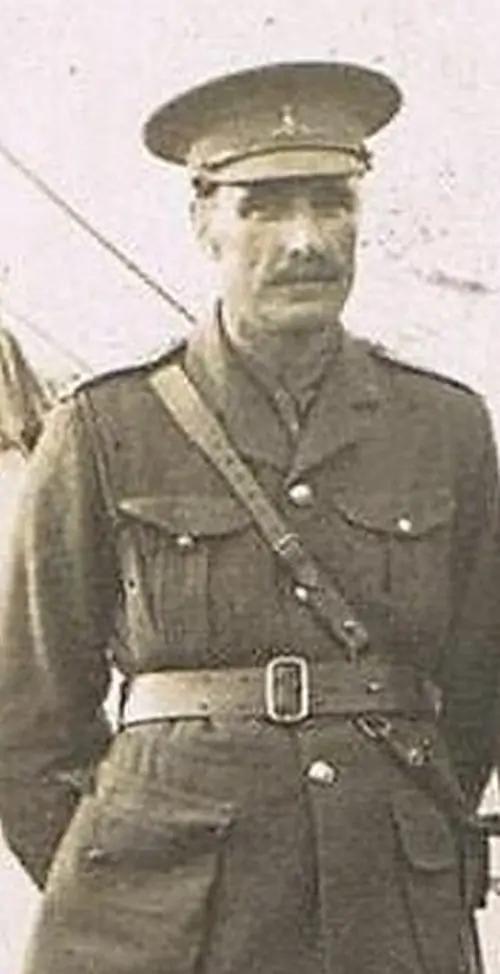
Captain Thomas Ernest Dufty was born in on the 30th of June 1880. His father was Arthur Richard Sykes Duffy and his mother was called Katie. He was educated at Pocklington Grammar School.
He joined the 5th Battalion in 1912 and became a lieutenant in June 1913. Prior to this his profession was as a banker and manager of the Bridlington branch of the London Joint Stock Bank.
Duffy was promoted to Captain on the 18th of April 1915.
He was reported as killed in action on or about the 19th of May 1915 (killed by a shell). His Battalion had been deployed to Sanctuary Wood (1.9 miles east of Ypres). His whistle and blood stained scarf are on display at the Green Howards Museum.
He left a widow, Beatrice, and a 4-year-old son Arthur Richard.
He is buried at the Vlamertinghe Military Cemetery in Belgium and commemorated at the Manor Road Cemetery Scarborough.

Explore more memories from the ribbon
-
Norman Angus
Norman Angus was born at Southwick, Co. Durham in 1890. He was working as a miner prior to enlisting in September 1914. He was posted to the 8th Battalion of the Yorkshire Regiment. He would have been sent to France in September 1915 and he had a somewhat chequered career. He had been promoted to Corporal by early 1916 but was reduced to Private. He was wounded in December 1915 and again in September 1916 and unfortunately had to forfeit 6 days pay for unauthorised absence in 1917. 14043 Corporal Angus was awarded the 1915 Star, the British War Medal and the Victory Medal. He died aged 84 in March 1975.
-
John Pattern
John was born in Leeds on the 31st July 1892. He was the eldest of five children. The family obviously moved round the country a lot as the 3rd youngest child was born in Liverpool and the two youngest children were born in Nottingham. John’s father originated from Norfolk, his mother from Hawnby in the North York moors. At some point the family settled in Great Yarmouth, the 1911 census giving an address as 86 Churchill Road. It was in Great Yarmouth that John married Dora (Dolly) Mary McQueen in September 1924. By 1939 they were living in Richmond, John’s occupation being a Secondary School Master, with Dora doing unpaid domestic duties. There does not appear to be a record of any offspring. John was obviously heavily involved with the town of Richmond and the people as he served as town mayor in 1957/8. John died on the 23rd November 1982 aged 90. At the time of his death he was living at 8 Gilling Road. During WW1 John served as a pilot, with the rank of Captain, in the Royal Flying Corps. John had joined the 10th Squadron RFC at Abeele, an airfield near Ypres Belgium, in May 1917. The 10th had been formed at Farnborough on the 1st January 1915. In April 1918 it would be re-designated the 10th Squadron RAF. Initially John flew De Havilland BE2s, a 2 seat biplane until the Squadron was re-equipped with Armstrong Whitworth FK8s, general purpose biplanes with a synchronised Vickers machine…
-
Wilfred Wood
Wilfred Wood, an employee of the North Eastern Railway before the outbreak of war, served with the 5th battalion of the Yorkshire Regiment. His commanding officer, 2nd Lt G H Smith wrote the following to his father: “Dear Mr Wood – It is with deep regret that I inform you of the death in action of your son, Pte. W. Wood. He was instantaneously killed on the morning of the 19th instant by a whizz-bang shell, which dropped into the trench he was in; he was buried behind the line on the 20th, and a good cross is being erected to his memory. Words cannot express how deeply I feel for you in your great loss. He was a good soldier, and always kept up bright spirits. The men of my platoon join me in the deepest sympathy for you” 240637 Private W Wood died on 19 July 1917 and is buried at Heninel Communal Cemetery Extension.
